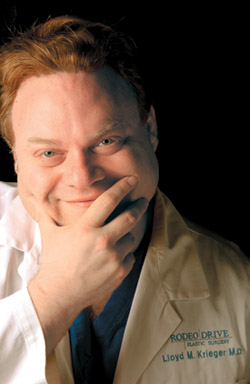 |
|
| Glimpses
Lloyd Krieger, MBA’92, MD’94, knows that elective plastic-surgery patients are different from other surgery cases. They’re there to look better, not to get better. “They don’t want to come into a hospital with all that implies,” he says: “the waiting, the inconvenience, the expense, sitting next to someone waiting for a liver transplant.” Enter Krieger’s Rodeo Drive Plastic Surgery, the first and only plastic-surgery clinic on the glam Beverly Hills shopping strip. According to its Web site, the fully certified facility boasts “crafted leather” exam chairs, “incredibly comfortable” operating tables, sherbet-shaded suites, and bamboo flooring. It also, he says, “takes the retailization of medicine to a very logical extreme.” Krieger, who interrupted his medical studies to earn an MBA, was the first resident in UCLA’s combined general/plastic surgery program and now is an assistant clinical professor there. He opened Rodeo Drive in 2003, two years after completing his residency: “That’s a very aggressive way of beginning to practice plastic surgery.” Boutique medicine: I see it as building a new approach to health care—bringing retail medicine out into the open, taking concepts from my retail neighbors and applying them to plastic surgery. It is designed to be more like a boutique than a doctor’s office. People come here to improve their appearance just like they step into one of our neighbors, like Armani or Chanel, to improve their wardrobe. Complementary goods: We might do a big liposuction on a man and change his suit size, then send him across the street to Hugo Boss or Barney’s, set him up with a personal shopper, and help him get started on his new wardrobe. We have relationships with some of the gyms and personal trainers. We work with personal trainers so that we can get people back in the gym very quickly after surgery, in as little as a week, at the same time protecting the surgical area, so they’re not at an increased risk for complications. Demand and supply curves: I don’t really have any trouble dealing with people who are shallow. If somebody comes in and says, I want bigger breasts, and maybe they don’t have a sophisticated reason, you might say they’re shallow, or you might say they’re goal-directed and have reasonable expectations. The Rodeo Drive belly button: Tummy tucks used to be purely debulking and damage control. Forty or 50 years ago, sometimes the belly button was just removed. We’ve changed the technique slightly—it actually creates a somewhat better hood at the top, for piercing, and throws a bit of a deeper shadow, so it looks more natural in a bikini and lowrider jeans. Smiling faces: Some patients are not going to be happy, no matter what the result. There is an emotional and psychiatric overlay to changing your appearance. For almost everyone it’s very difficult to objectively analyze a change. It’s like any other customer-service industry. There are people who have an excellent outcome, but they’re still disappointed. Elasticity of demand: Beverly Hills is ground zero for plastic surgery. If I’m going to change the way plastic surgery is perceived—more than an acute surgical interaction, it’s about a whole lifestyle interaction—I have to be here. Why you won’t see him on a reality TV show: The Swan is a very tacky show—it’s built with a contest as the premise. I was not impressed with the clinical results. Or on MTV’s I Want a Famous Face, they’re remade to look like somebody famous. I would never get involved with that. Do-it-yourself: I have not had plastic surgery. I’m going to get some liposuction in the next year-and-a-half or two years. The big thing is taking time off. You do have to take a certain amount of time to have a good result. |
|
phone: 773/702-2163 | fax: 773/702-8836 | uchicago-magazine@uchicago.edu

